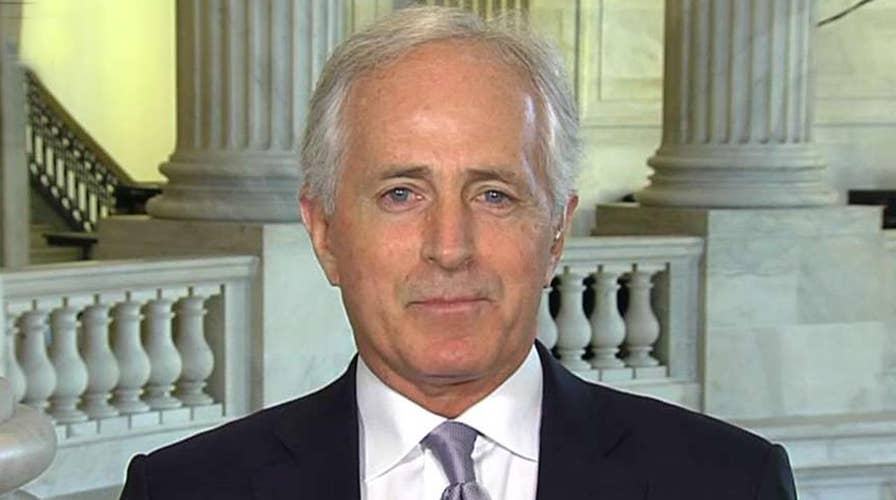Sen. Corker on how Senate is shaping tax bill ahead of vote
The Republican says the reform plan needs to serve both immediate and long-term interests.
Senate Republicans advanced their tax reform plan in a key committee vote Tuesday, as President Trump confidently predicted passage -- after visiting Capitol Hill in a bid to win support from GOP holdouts.
"I think we're going to get it passed," Trump told reporters.
The Senate Budget Committee moments earlier voted 12-11 to advance the plan to the full Senate, paving the way for a possible floor vote later this week.
"The momentum driving our shared priorities of job growth, economic competiveness, and fiscal responsibility through tax reform is undeniable," White House Press Secretary Sarah Sanders said in a statement Tuesday.
Earlier in the day, Trump joined fellow Republicans at their weekly Senate luncheon to talk taxes. He described the meeting as "phenomenal" and "somewhat of a lovefest."
Trump needs nearly all 52 of them to help pass the reform legislation with a simple, 51-vote majority.
However, a handful of GOP senators still appeared undecided, including Susan Collins of Maine, Bob Corker of Tennessee, Jeff Flake and John McCain of Arizona, Ron Johnson of Wisconsin, Rand Paul of Kentucky and most recently Steve Daines of Montana.
But both Corker and Johnson backed the legislation in the committee vote Tuesday.
Senate Majority Leader Mitch McConnell didn’t talk about what was discussed in the Trump meeting but addressed the effort to round up votes.
“It’s a challenging exercise. Think of sitting there with a Rubik’s Cube and trying to get 50” votes, the Kentucky Republican said.
Several sticking points have emerged since the Senate began working on its version in early fall -- the latest being whether small businesses will get their fair share of tax relief.
Senators such as Johnson and Daines want lower taxes for the small businesses including so-called “pass-through entities” -- companies whose profits go to the owners, who report the income on individual tax returns.
“We need to take care of Main Street businesses,” Daines said. “Smaller states tend to have more Main Street businesses.”
However, fiscal hawks like Corker and Flake are raising concerns about whether more cuts -- and miscalculations about already proposed cuts -- will add to the federal deficit and debt.
One analysis projects the entire GOP plan will increase the federal deficit by $1.4 trillion over the next 10 years.
Corker and others want the GOP plan to include a “trigger” or “backstop” that could revamp or reverse tax cuts if they don't spur the projected economic growth or if they increase the deficit beyond projections.
“We’re working on that right now,” Corker said Tuesday morning on Fox News’ “Fox & Friends.” “Hopefully, it’s going to be successful.”
Collins, Corker, Daines and Johnson on Monday talked with Treasury Secretary Steve Mnuchin.
Earlier concerns among GOP senators included whether the corporate tax rate will drop from 35 percent to 20 percent and if middle-class Americans would still get to deduct their state and local taxes.
The House earlier this fall passed its tax reform bill. If the Senate passes its version, GOP lawmakers from the respective chambers would meet to negotiate a compromise plan, which Trump would sign for his first major legislative victory since taking office in late January.
No Democrats thus far support the GOP tax plan.
Trump also had been scheduled on Tuesday to hold a White House meeting with the top bipartisan congressional leaders, covering negotiations over a temporary spending bill and other issues.
However, House Democratic Leader Nancy Pelosi and Senate Democratic Leader Chuck Schumer pulled out after Trump tweeted that there might not be a deal with them.
“Meeting with ‘Chuck and Nancy’ today about keeping government open and working,” Trump tweeted Tuesday. “Problem is they want illegal immigrants flooding into our Country unchecked, are weak on Crime and want to substantially RAISE Taxes. I don’t see a deal!”
Some Democrats want the budget measure to include legislative protections for young illegal immigrants known as "Dreamers," amid opposition to the idea from conservative Republicans.
Trump hasn't engaged much with Pelosi and Schumer since a September meeting that produced an agreement on a short-term increase in the government's so-called debt limit and a temporary spending bill that is now keeping the government running.
McConnell and House Speaker Paul Ryan, R-Wis., were still attending the White House meeting with Trump.
“I have never refused to go to a bipartisan meeting that a president has called,” McConnell said after Trump left Capitol Hill.
Schumer and Pelosi issued a joint statement saying they will try to negotiate the spending bill and other end-of-the-year issues alone with GOP congressional leaders.
Fox News' Chad Pergram and The Associated Press contributed to this report.





